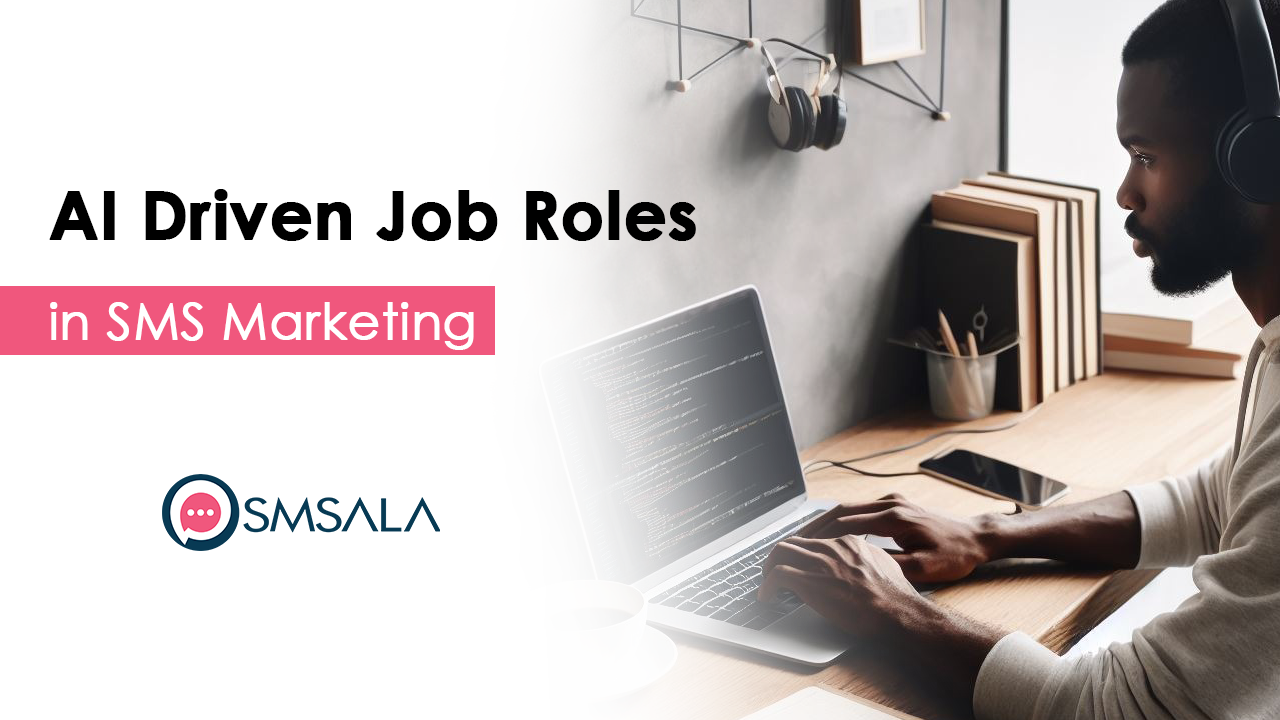Welcome to the Evolving World of SMS Marketing that is now being revolutionized by the integration of Generative AI! This transformative AI Technology is Rapidly becoming a Cornerstone for businesses keen on elevating their Audience engagement, Acquisition, and Retention.
While we haven’t quite reached the sci-fi vision of iRobot, where AI assists in all aspects of life and work, the influence of generative AI is undeniable. It’s already making a mark in the workplace, with a recent survey revealing that 29% of Gen Z, 28% of Gen X, and 27% of Millennial professionals are utilizing generative AI tools in their daily operations, showcasing the growing importance of job roles related to AI.

Generative AI seamlessly integrates into our daily lives, often without us even noticing. From the simplicity of unlocking our phones with Facial recognition to the complexity of Self-driving Cars and advanced Banking Systems, AI is everywhere. And now, it’s making a significant impact in the realm of SMS Marketing, creating new opportunities and job roles related to AI implementation and management.
So, what exactly is Generative AI for SMS Marketing, and why is it becoming a crucial tool for small business owners and non-profits? The answer lies in its ability to Transform Operations, Enhance the Online Customer Experience, and Improve both Retention Rates and ROI, all of which contribute to the increasing demand for professionals in job roles related to AI. Whether you’re just starting out or looking to upgrade your existing strategies, Generative AI presents an opportunity to connect with your audience in more personalized and effective ways, thus shaping the landscape of job roles in the AI sector.
What Is Generative AI for SMS Marketing?
Generative AI in SMS marketing is all about Crafting Personalized Messages and Automating Marketing Efforts to Target Specific Customer Groups. This technology works by learning from a Dataset, It picks up patterns, structures, and unique characteristics, and then applies this knowledge to create new SMS messages. This process, commonly referred to as “Language Modelling”, allows the AI to Produce Text, and even Images, Videos, or Audio Files that echo the style and essence of the Original Data.
This approach falls under “Generative Modelling”, a subset of Artificial Intelligence focused on creating new content. Unlike Traditional AI models that predict or classify data based on existing patterns, generative AI is trained to produce original output. In the context of SMS marketing, this means generating messages that are not just unique but also closely aligned with the preferences and behaviours of the audience, as reflected in the dataset. This dataset typically comprises various forms of data, like text or images, and serves as a guide for the AI to learn and make informed content-generation decisions.
Generative AI for SMS marketing also includes the ability to automate entire marketing campaigns. Based on certain triggers or customer actions, such as signing up for a newsletter or making a purchase, the AI can send a series of follow-up messages. These messages are designed not just to maintain communication but to encourage further interaction and deepen the customer’s relationship with the brand.
Benefits of Using Generative AI for SMS Marketing
The surge in Generative AI adoption is a testament to its effectiveness in the realm of SMS marketing. In 2022, adoption rates were already at 23%, and projections suggest this number could soar to 46% by 2025. This rising trend is evident across various sectors, including retail, education, healthcare, technology, and more. The reasons? The numerous benefits that generative AI brings to SMS marketing strategies:
- Automated Messaging Personalization: Generative AI excels in personalizing messages. It can integrate details like customer names, past purchases, and other relevant information to craft messages that are not only tailored to each recipient but also save time and effort for your team.
- Enhanced Creativity and Topical Reach: Struggling with creative block for your SMS campaigns? Generative AI can be your creative ally. Analysing extensive data sets can generate fresh concepts and ideas, breaking through creative limitations and opening up new avenues for message strategy.
- Intelligent Content Generation: This technology uses customer data as inputs to create SMS messages that resonate with individual customers. It considers nuanced customer details like preferences, behaviours, and purchase history, ensuring the content is not just generic, but specifically tailored.
- Improved Customer Experience: Generative AI takes customer service to the next level. It enables the creation of contextually relevant and engaging text messages, enhancing the overall customer experience. The combination of personalization, speed, and deliverability positions generative AI as a crucial tool in any SMS marketing strategy.
- Faster A/B Testing Capabilities: With generative AI, your marketing team can quickly generate various versions of messages for different purposes – be it promotions, notifications, or events. This capability allows for effective A/B testing against different audience segments, helping to pinpoint the most successful messaging strategies.
- Sustainable, Scalable, and Consistent: As you scale your SMS marketing efforts, maintaining a consistent style, tone, and branding becomes paramount. Generative AI aids in this by ensuring consistency across numerous messages, thus preserving brand integrity and recognition. This consistency, coupled with the ability to scale, makes generative AI an indispensable tool in SMS marketing.
Disadvantages of Using Generative AI for SMS Marketing
While generative AI holds great promise for transforming SMS marketing, it also presents several challenges that organizations must navigate. Understanding and addressing these issues is crucial for effectively leveraging AI technology in a way that maximizes benefits while minimizing potential drawbacks.
- Algorithmic Bias and Data Quality: One of the primary challenges is the risk of algorithmic bias. Since generative AI models learn from existing datasets, any inherent biases in the data can be reflected in the messages generated. This could lead to skewed or insensitive messaging, which can harm customer relationships and brand reputation.
- Maintaining Personal Touch: Striking the right balance between automation and personalization is another significant challenge. While generative AI can greatly personalize content, there’s a delicate line between messages feeling personally crafted and seeming overly automated and impersonal.
- Regulatory Compliance and Privacy Concerns: Adhering to regulations such as GDPR and TCPA is essential in SMS marketing. Generative AI must be carefully managed to ensure that all communications comply with these laws, particularly regarding consumer consent and privacy.
- Integration and Technical Complexity: Incorporating generative AI into existing marketing systems can be technically challenging. Organizations need the right infrastructure and technical expertise to effectively implement and manage these advanced AI systems.
- Content Relevance and Quality Control: Ensuring the relevance and quality of AI-generated content is crucial. There’s always a risk that the content may not entirely align with the brand’s tone, style, or messaging goals, requiring ongoing monitoring and adjustments.
- Ethical Considerations: The ethical implications of using AI in marketing communications, such as the potential manipulation of consumer behaviour, are a growing concern. Companies must consider the ethical ramifications and strive for transparency and fairness in their use of AI technologies.
- Scalability and Resource Allocation: As businesses scale their SMS marketing efforts using generative AI, they must also consider the resource allocation for managing this technology. This includes the time and personnel needed for oversight, content review, and system adjustments.
- Customer Perception and Acceptance: Finally, there is the challenge of customer perception. Some customers might be sceptical or uncomfortable with receiving AI-generated messages, preferring human interaction. Understanding and respecting customer preferences is key to the successful adoption of AI in SMS marketing.
Final Note
As we look towards the future, it’s clear that generative AI will continue to evolve and play an increasingly vital role in shaping the landscape of SMS marketing. For businesses willing to navigate its complexities, generative AI promises not only to streamline operations but also to forge deeper and more meaningful connections with customers. By staying informed, adaptable, and ethically grounded, organizations can harness the full potential of generative AI to revolutionize their marketing efforts and drive sustained growth and customer satisfaction.

